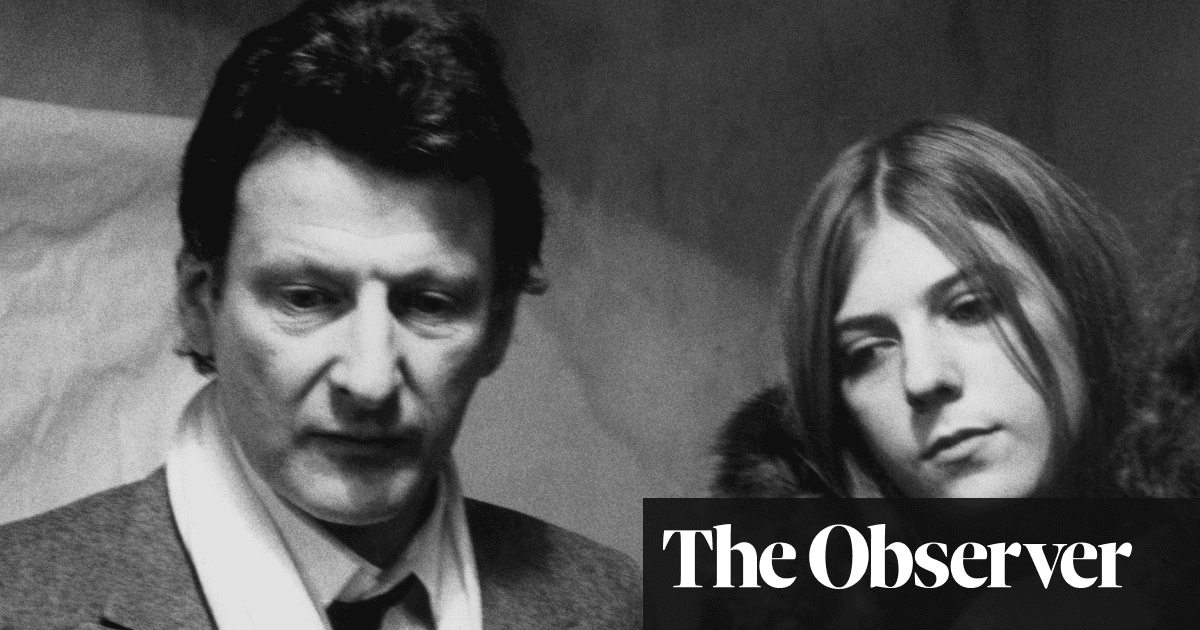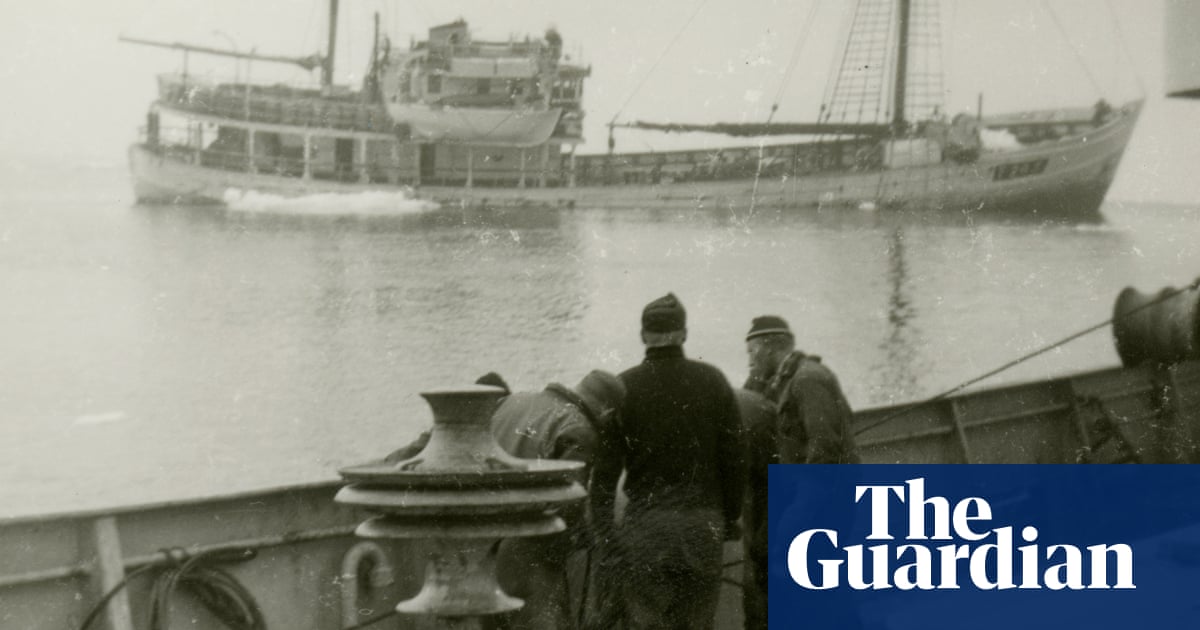Rose Boytâs memoir, Naked Portrait, is, in the narrowest sense, her account of sitting for three paintings for her father, Lucian Freud. In the first, she sprawls, unclothed, legs spread wide on her fatherâs chaise, aged 18. In the second, at 31, she is buttoned up in a dark shirt, hair cropped, refusing the artistâs gaze. And in the third, at 39, she perches on a sofa arm, beside her husband, Mark Pearce, his son Alex, and their new baby Stella, in a homemade floral patterned dress.
You might say that the loose triptych represents a sort of allegory of independence for Boyt, from the wildly overbearing legacy of her father, and in some ways her book has that sort of triumphant, survivorâs note. But, as with anything concerning Freud, the reality is way more complicated than that.
Boyt, one of Freudâs 14 acknowledged children, is now 65. She has a special place in the famous pantheon of heirs in that Freud chose her, alongside a lawyer, to be the co-executor of his £96m estate, a process that has occupied her for a great deal of the 13 years since his death. One way of thinking about her memoir might be as a climax to that other consuming task. Plenty of people have had their say on Freudâs entirely singular life (âI donât read any of that crap,â Boyt says) but no one is better placed than her â also the author of three novels of chaotic families â to weigh its extremes.
At the heart of her memoir is a diary that she kept when she was sitting for the middle portrait, which she has now re-examined in light of her own experience of parenting and therapy and #MeToo: âUntil I had read the diary I had completely forgotten all that sex talk [with Dad],â she writes at one point, of her fatherâs compulsion to overshare with her about his wolfish libido. âI just smiled and laughed when I should have put my hands over my ears and screamed: SHUT UP YOU SICK FUCK,â she suggests. But, then, in the next breath: âWe [the children of different mothers] wonât have a word said against him.â
One of the compulsive aspects of Boytâs book is that, as a reader, you get to listen in on her trying to make honest sense of events that go well beyond what any daughter might be expected to fathom. The book is 416 pages long, and having started it one morning a couple of weeks ago, I ended up reading it in one sitting, well into the early hours of the following day, taking notes such as these: âLF brings two live lobsters to house on day Rose is born and insists her mother boils them up for supper in nappy bucketâ; âRose travels world on cargo ship with mother and three siblings; boat sinksâ; âRose first time in New York: Andy Warhol draws ring on her finger and âproposes marriageââ; and âRose says her father ânever was in love or made anyone happyââ.
A couple of days after this immersion in her story, I sat with Boyt on the sofa in the elegant Islington townhouse in which she has lived in for 33 years. Where to start? One of the things that struck me, reading her book, I say, to begin with, was that her fatherâs infamous fear of domesticity, of anything ever being mundane, seemed infectious. Did everyone in his orbit feel under pressure to be extraordinary all the time, to catch his interest?
She concedes that âbeing the child of a sort of gorgeous genius makes peopleâs expectations of you unbelievably high,â but also contends that she is her motherâs daughter at least as much as her fatherâs. One of the psychological challenges of her adult life, she says, has been that nothing shocks or surprises her. âI think,â she says, âliving on the ship did that.â
So we talk first about how when she was seven, Boyt, her mother and her three young siblings sailed around the world on a leaky cargo ship her mother had sold their home to buy. It began, like much of Boytâs life, by accident. Suzy Boyt was Freudâs student at the Slade, 17 years his junior when they met; in what became a familiar pattern with his women, she had his children in quick succession, and all but gave up her own artistic ambitions.
âYouâve got to picture my mum, this beautiful glamorous artist, with four kids,â she says. âOne day, sheâs in this Mini at the top of a hill and she decides to put the brakes on and slide down the hill because it is icy. It all went wrong and she crashed. And then this tall, blond Germanic sea captain appeared out of nowhere to rescue her.â
This was a man Boyt calls only Uwe in the book; having swiftly fallen in love with him, Suzy Boyt thought it would be a âa marvellous adventureâ for the kids to sail around the world with him on a cargo ship. Is that how Rose saw it?
âI think in real time, as a child you donât actually think, âOh, bums, I wonât be able to go to school any more,ââ she says. âYouâre up for it. Itâs taken me a long time to describe how it really was: I always felt loved. But I didnât feel safe.â
It was often Roseâs job to look after her baby brother Kai on deck. âThe first time I lost him we found him hanging from his fingertips over the mouth of the hold, a sheer drop of 30 feet,â she writes. âThe second time he had gone overboard⦠Mum and Uwe jumped over the gunwale and fished him out of the freezing waterâ¦â The adventure lasted about 18 months and ended with the family in Trinidad and a drunken telegram from Uwe from a solo voyage: âSHIP SUNK, GO HOMEâ; they were repatriated, penniless, back to Islington.
The experience left her with a kind of outlaw sense. She recalls taking a big knife into her primary school, and being outraged that the headteacher confiscated it. âI was probably pretty strange,â she says. âItâs why Iâve spent much of my later life trying to be as bougie and normal as possible.â
By that time, her father had established the pattern of his life: numerous lovers, heavy gambling, high- and lowlife friends, all organised around the intense 24-hour compulsion of his painting. How big a presence was he in her life in those years?
âHe was around plenty enough,â she says. âI can remember saying to Mum, once: âWhereâs Dad?â And her saying: âOh, heâs at work.â And I just thought: âOh, dads go to work, whatever.â But I kind of knew we were different. I can remember going to the house of a girl from my secondary school. They had a bowl of peaches on the table. And I remember trying not to stare, ogle the peaches. After that I was aware that other people had bowls of peaches on the kitchen table. We didnât.â
Understatement is Boytâs default tone. âDad was certainly confusing,â she says. She recalls the occasion that he took her off to Patisserie Valerie in the West End, and put his fingers in every cream cake on offer, before leaving an outsize tip for the waitress. âI knew that at home mum had, like, one onion, one tin of tomatoes, one bag of spaghetti for five children,â she says. âI thought about putting that tip in my pocket for her, but I didnât.â Her mother never asked for any money from Lucian.
As Boyt got older, she must have become more aware of the cruelty of that financial disparity between her parents?
âI left home when I was 15. I was just: Iâm out of here,â she says. âBut also, Dad could not really be blamed for Mum having bought the ship and it sinking.â (As she notes in the book, it is still a reflex for everyone around the artist to make excuses for his behaviour â even, as Boyt notes at one point, her own therapist.)
One of the prompts for her leaving home was the trauma of being raped, at 14, by one of her older brother Aliâs friends. The general response from the family seemed to be âshit happensâ. There were other sexual traumas; she had lived in fear of being alone with Uwe, who, among other things, was in the habit of having the children line up naked on deck and dousing them with cold water. The drunken sailor returned to haunt the family in London for a while, before attempting to kill himself by jumping off Tower Bridge. Boyt moved in with her boyfriend round the corner from her father at 15, a sort of self-conscious wild child, working for a while in Vivienne Westwoodâs Kingâs Road shop and looking for ways to inveigle her way more closely into Lucianâs life. She cooked him fried eggs on toast after school and cleaned his studio; she was a convenient friend for his lovers.
It was around this time that her father asked her to sit for him.
That memory first prompted her book. She had written an essay about it for an exhibition catalogue, but when she really came to think about that account, she felt she hadnât been quite honest.
âI started it with the description of going into my fatherâs studio. Nothing had been discussed about what I should do. But I just seemed to think: âOh, yeah, Iâm supposed to be naked.â As the writing of the book progressed, I allowed myself to be more angry, more straightforward about all that.â
She realised that her previous essay âwas a version that I created not to shame myself, or my fatherâ. Now she recalled the full range of emotions she felt. Her father spent some time asking her whether she was OK with the dramatically exposed position on the chaise she had to hold night after night. She didnât really know what she was giving permission for, until she got to look at the canvas, âand saw what he was seeing⦠I was really shocked,â she says. âI was thinking: âHave you got a periscope? Can you see around corners?ââ
As with all Freudâs work, the painting went on, dusk till dawn, several nights a week over months. He wanted to call the finished work The Artistâs Daughter, a title âthat would make anyone think of incest,â Boyt says. âNot that I wanted to have sex with him, nor him with me, just in case you were wonderingâ¦â she writes. He called it Rose as she requested.
She had liked to think of their relationship at the time as being âlike that between two teenagersâ. In retrospect, she recalls more âof what I now might call micro-aggressionsâ, deeply controlling behaviour and stabbing himself in the thigh with his paintbrush if things were not to his liking.
âWhen youâre sitting you feel incredibly unimportant, because [his] worldâs full of naked girls, half of whom are your sisters,â Boyt recalls of those mixed emotions. âThereâs just too many sitters, too many sisters. And then at the same time, you are feeling so very important, because youâre being scrutinised.â
That process inevitably left her with identity issues. âIf you see yourself naked in a painting, and the paintingâs been painted by your genius father who knows everything, you then think: âIs that who I am?â Youâre so valuable because of the painting â but then are you valuable in other contexts?â
The temptation, particularly in our censorious times, might be to condemn Freud out of hand for his most extreme behaviour. But Boyt refuses even to attempt to come to a settled judgment about her father â which is exactly what makes her book feel so truthful.
âI think that ambiguity is a luxurious position,â she says. âYou canât allow yourself ambiguity when things are very unstable. And I think my achievement is to allow a massive level of ambiguity. I realised in the writing that I was contradicting myself every five minutes: I love him, I hate him. He loves me, he doesnât. Everythingâs up for grabs. I mean, I obviously wasnât going to write this to cancel him or whatever. And I wasnât going to write a book about him being the god of me. We maintained a lot of respect and affection despite being two awkward cusses.â
after newsletter promotion
By the time of her second portrait, she was a far more reluctant sitter and tried to refuse, âbut,â she says, âthere was not really an option for him to be able to say: âOh, yes, thatâs fine.ââ
Her determination was at least to keep a private record of their nights together. She would take furtive notes about their endless conversations in toilet breaks and type them up when she got home. She says she had not looked at that diary in decades when she uncovered it during house renovations.
She was embarrassed by a lot of it when she did. She laughs. âThereâs way too much about wanting a husband. Itâs very Bridget Jones.â She couldnât look at it for a while after the death of her father, but then the plan was to go back and extract âall Dadâs stories, which I remembered as being hilarious, stories about gangsters and film stars, lords and ladiesâ. But then when she got into it, âit all turned into something elseâ.
The change was partly a change in the culture; women were suddenly speaking out about patriarchal power, Boytâs therapist encouraged her to re-examine her memories.
âWhen I started it, there was no sense of myself as having had crimes perpetrated against me, none of that. It was only reading the diary, and then typing it up. It was only then that I started to think: âOh: me, too.ââ
She is angry in the book that her parents did not respond to the fact of her rape, or her anxieties around Uwe.
âI think I had secrecy bred into me,â she says. (Outrageously at one point, Freud, who disliked the confessional tone of her first novel, Rose, tried to appeal to artistic discretion on the basis of âfamily feelingâ.)
She wrote in her diary of a persistent sense of worthlessness; that her life was not supposed to work out; that happiness wasnât for her. Has she conquered that?
âI had always felt that I had no right to mind what happened to me, but now I feel different,â she says. âFor me, the feeling of working through shame and recognising it, and not being implicated in it, has been really important. Just being able to speak out. I mean, take this interview, for example; rather than thinking: âOh, my God, heâs going to stitch me upâ; Iâm trying to think: âOh, a chance to tell my storyâ¦ââ
By the time of that third family portrait, the power balance between ageing father and daughter had begun to shift. Her Bridget Jones efforts had borne fruit in her mid-30s in the most unlikely of places â she met her husband, Mark Pearce, a recent widower, across the hospital bed of her friend, the Observer theatre critic Susannah Clapp, whom they were both visiting. One result of that marriage was that Boyt for the first time was able to make some demands of her father. She said she would not sit for another portrait unless she could do it with her husband. And, looking back, she says: âI must have known that I was in with a chance of getting pregnant â I made the dress that I was going to wear in the painting, and it was one of those crossover wrap dresses that ties behind that could expand.â After some months she conveyed the happy news to her father.
Inevitably Freudâs first thought was the painting. ââOh for fuckâs sake!â he raged⦠and then he was really happy for meâ¦â
The announcement changed their relationship. âObviously, once youâre pregnant, you have power: âSorry Dad, I need to go to the bathroom.â âSorry Dad, I need to get some food.â I wasnât trapped in the studio any more. And then I went away, and had the baby.â
Freud pestered her and Mark to return. âThe babyâs going to be in the painting, you know that?â she said. The artist had a mortal fear of prams but, as she says, âeven he knew you couldnât just leave babies at home any more. Stella was nine months old. Alex [Pearceâs son from his first marriage] came with us too, obviously. And nine months later, I was pregnant again. This time, Dad realised that there was nothing he could do about anything. And so he painted this cute little embryo like seaweed with a flower or something [under the final painted layers of her dress]; it was very joyful; the painting was finished just before Vincent was born.â
Boyt claims to have no real idea why he asked her to be his executor.
âHe must have thought you were trustworthy and wouldnât piss the others off too much,â I suggest.
âMaybe. But that would imply that he couldnât trust anybody else, which wasnât true.â
She is very anxious not to place herself centre stage among her siblings. âI donât think anyone else was fighting to do it,â she says. âBut I was thrilled, really. It really made me feel seen in a different way to the naked portrait. I thought: âThatâs a side of me thatâs not been valued, or that hasnât been noticed.ââ She has enjoyed the responsibility of the process, âand no one has tried to kill me yetâ.
Boyt doesnât really want to talk about her fatherâs last days, because they are not only hers to share. One thing she does confide is that when she sat by Lucianâs bedside she read two books to him: one was The Man in the Blue Scarf, which is critic Martin Gayfordâs account of sitting for Freud. The other was Middlemarch.
She chose the latter, she says, perhaps because it was the book that did for her what her parents hadnât done â given her an understanding that doing the right thing might be something worth striving for.
âItâs funny,â she says, âbut when I read Dad quotes from Martin Gayfordâs book â things he had said himself â he would be like: âI couldnât agree more.â But when I read Middlemarch, Dad was constantly railing against the authorial voice: âWhy is she telling me what to think and what to feel?ââ
I wonder if now that the business of their fatherâs legacy is mostly concluded, his children still find good reasons to get together?
âAll the time,â she says.
And do they spend all their time trying to get these stories of the past straight?
âNo, we donât really talk about that,â she says. âEveryoneâs got their own thoughts and feelings and relationships with Dad. My brother Ali [who also has a book in the works] sometimes tells preposterous stories about him and Dad on the razzle, but thatâs about it. The other day it was Bellaâs party. We have these big parties when nearly everyone goes and we talk about our own children â and our own grandchildrenâ¦â
Before I go, I wonder how her own formative years shaped her as a mother â her children are now 26 and 25.
âI feel blessed that neither of them have been interested in drugs and alcohol,â she says. âPut it this way, I donât think I was ever going to create a daughter who wanted to leave home when she was 15.â She smiles. âIâm certainly not the biggest fan of chaos.â



